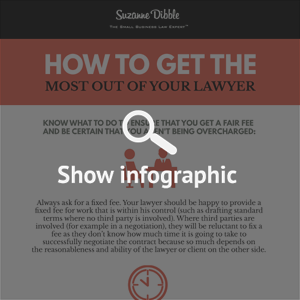
There has been a bit of a stink in the legal press recently. The world’s largest law firm (in fact, the US arm of the firm I used to work at) was caught out big time in inflating its invoices. The firm’s lawyers were trading casual emails about the case and joking about how the invoice was running way over budget while another lawyer emailed “churn that bill, baby!”
One of the emails stated “Now Vince has random people working full time on random research projects in standard ‘churn that bill, baby!’ mode. That bill shall know no limits.”
Now this may seem despicable to many of you (indeed it is to me) but this “padding” of bills does happen so you need to know what to do to ensure that you get a fair fee and be certain that you aren't being overcharged:
- Always ask for a fixed fee. Your lawyer should be happy to provide a fixed fee for work that is within his control (such as drafting standard terms where no third party is involved). Where third parties are involved (for example in a negotiation), they will be reluctant to fix a fee as they don’t know how much time it is going to take to successfully negotiate the contract because so much depends on the reasonableness and ability of the lawyer or client on the other side.
- Understand where the fixed fee ends and when the hourly rates start.
- Check very carefully what the firm charges extra for – telephone calls, faxes, photocopying, couriers, lunches? When I was working in-house, I was amazed to see that I was being billed for my lawyers taking me out to lunch… This should all be set out clearly in your Engagement Letter so make sure you understand how much they are charging for such things and if you feel that is unreasonable, question them.
If you can’t get a fixed fee, keep in mind the following advice:
- Check how the hourly rate is billed. Some law firms charge on “units” of a minimum of 10 minutes – so what this means is that if a lawyer spends one minute on your matter, they bill you for 10 minutes. Doesn’t seem fair does it, but that is what a lot of law firms do. Ask for units of 5 minutes or even better ask the firm to agree to just invoice you for the actual time spent to the nearest minute.
- Ask for a detailed billing guide to be sent with every invoice and spend the time to go through the billing guide with a fine toothcomb and if you see something that you feel is unreasonable (such as being charged £200 for voicemails left for you while you were out to lunch), take this up with your lawyer or relationship partner and explain that you want to see more efficiency – you can guarantee that the lawyers will be more careful and reserved over their time recording on your matter in the future.
- Request an update of work in progress (ie the work that has been carried out but not yet invoiced) every week or month together with a detailed guide to that work. This will help you budget and if you feel your invoice is running away with you, you can contact your solicitor to reign him in a bit or discuss where efficiencies can be made.
- Check that you aren't going to be expected to pay for overtime at higher rates, taxis home or dinners when working late.
- When you don’t have a fixed fee, time is money. So don’t spend 20 minutes chatting to your lawyer about his holiday as they are probably billing you for that time.
- Pick up the phone – a lot of time is wasted by trading email messages that don’t really get you anywhere. Beware that a lot of junior lawyers will hide behind the email.
- Be concise and precise in your instructions to your lawyer and confirm them in writing, so that there is no doubt as to what you want them (or don’t want them) to do.
- If you have the time to do it (or can delegate to a member of your staff), volunteer to do administrative work to avoid your lawyer doing work that doesn’t require his specialist knowledge – no point paying £250+ an hour for someone to input factual details into schedules of an agreement.
On the other side of the coin, many lawyers will be willing to go that extra mile for you if you treat them nice… So be a good client – yes it is a two way relationship and chances are that if your lawyer feels warm and mushy about you, they are going to put your work to the top of the pile, give you special rates and let you call them about any issues you have without charging you for it. You can be a good client by:
- Paying your invoices on time and without being chased.
- Not setting false deadlines or exaggerating how urgent something is – if you say something is urgent and your lawyer stays up all night to draft something for you and then you take two weeks doing what you need to do to the document, don’t be surprised if the next time you say something is urgent, your lawyer isn’t quite so enthusiastic to make a personal sacrifice for you.
- Appreciating your lawyer when they have gone beyond the call of duty for you. Thank them, sing their praises to your peer group, provide them with an enthusiastic testimonial, send them some flowers (or my particular favourite a Fortnum and Mason hamper…), invite them on your next golf day – and they will not think twice about making more sacrifices when you need them.
- Being open and honest with your lawyer and not holding back on providing them with information that they need to do their job properly.
- Being pleasant, courteous and treating them as person and not a commodity – a one minute chat about their kids isn’t going to add anything to the bill and will do wonders in establishing a relationship.
Finally, find out what services your lawyers offer free of charge – do they provide free seminars, a newsletter, legal bulletins, a library service – all of which will help you to protect your small business and potentially save a lot of time and money in avoiding expensive mistakes. Speaking of which, I am running a series of free webinars on topics such as “all you need to know about taking on your first freelancer” and “the legalities of running an e-commerce store”.
Click here to see more details and sign up!
Copyright © Suzanne Dibble 2013
Disclaimer
Although the concepts in this article have global application, the information contained in the article is based on English law only and is provided for information purposes only and is not intended to amount to advice on which reliance should be placed. Suzanne disclaims all liability and responsibility arising from any reliance placed on such information. Professional advice should be obtained before taking or refraining from taking any action as a result of the above contents.













